Unit 2 What time do you go to school Period 1 Section A(1a-2d)课件(共57张PPT,内嵌音频)
文档属性
| 名称 | Unit 2 What time do you go to school Period 1 Section A(1a-2d)课件(共57张PPT,内嵌音频) | 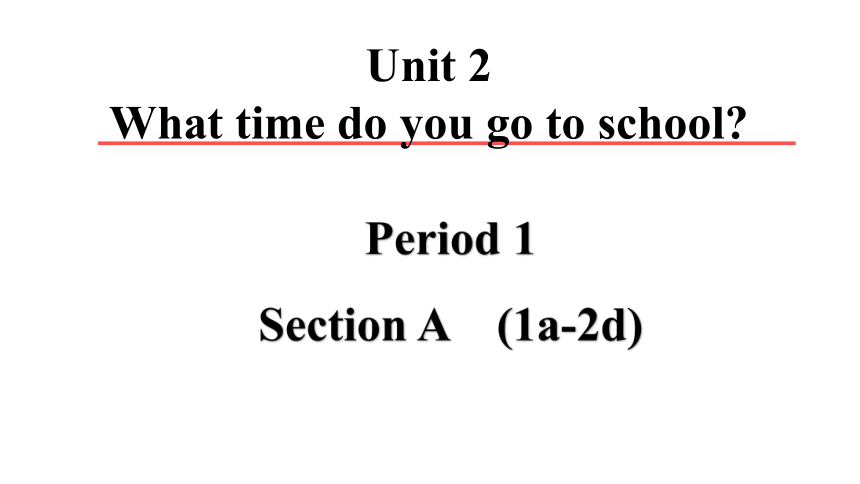 | |
| 格式 | pptx | ||
| 文件大小 | 21.4MB | ||
| 资源类型 | 教案 | ||
| 版本资源 | 人教新目标(Go for it)版 | ||
| 科目 | 英语 | ||
| 更新时间 | 2023-12-18 09:43:25 | ||
图片预览

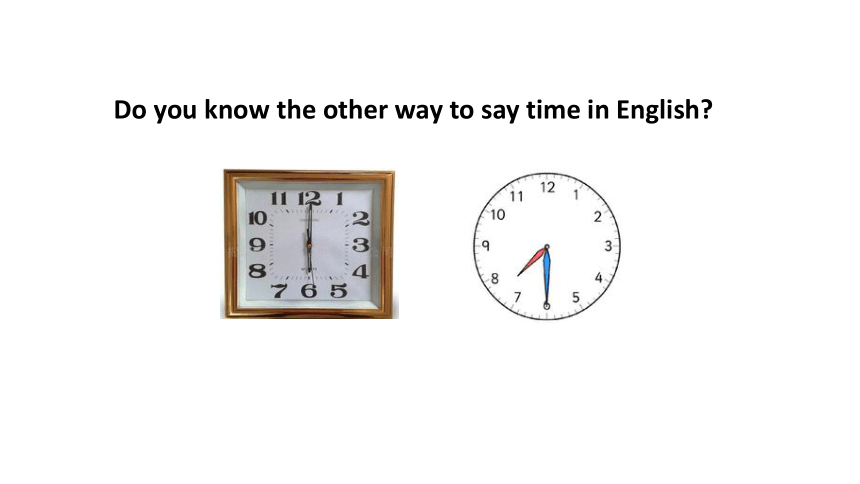
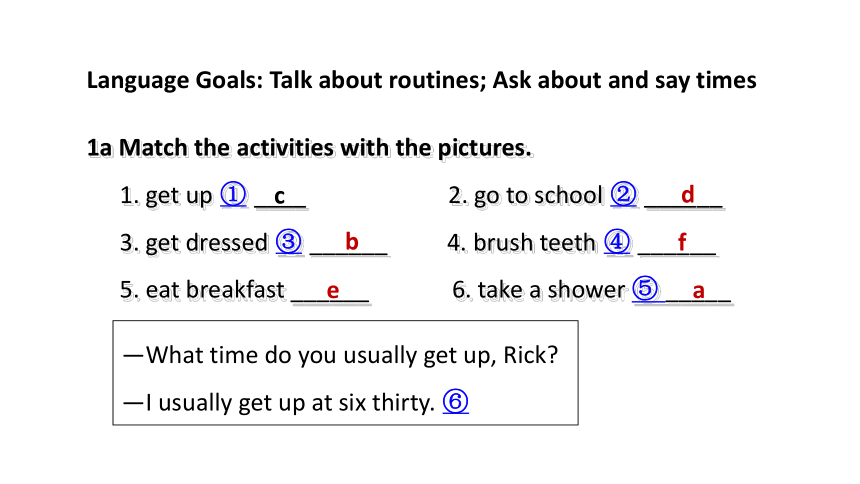
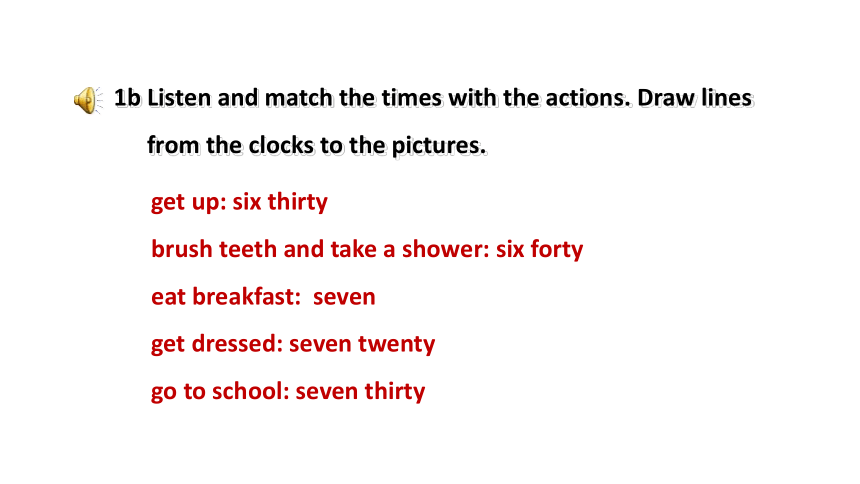
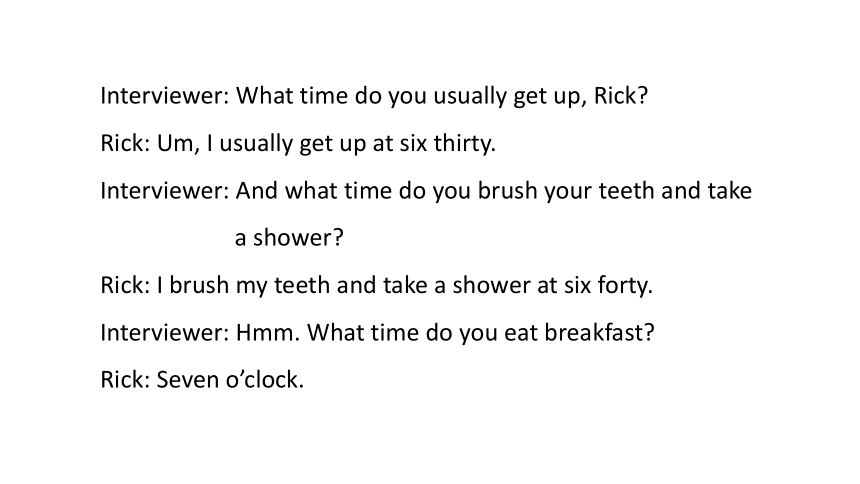
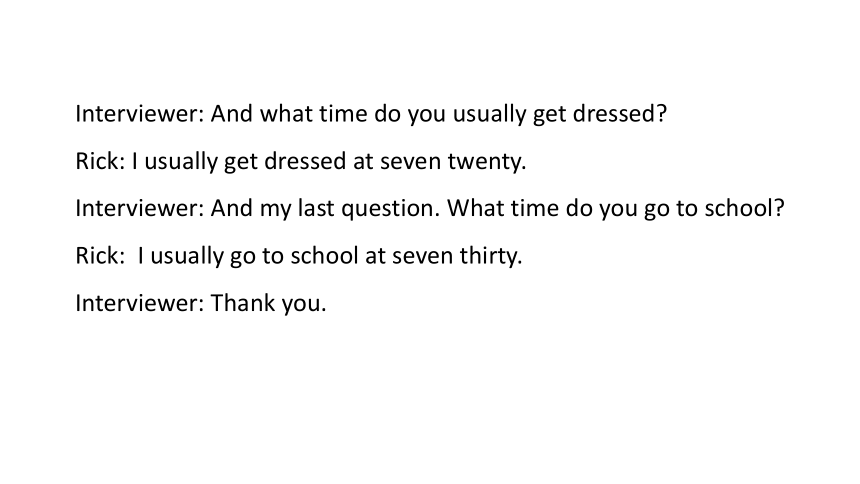
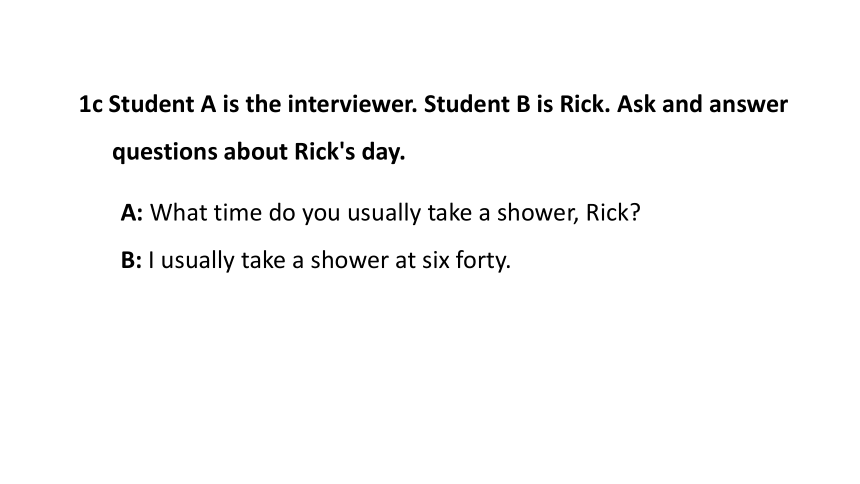
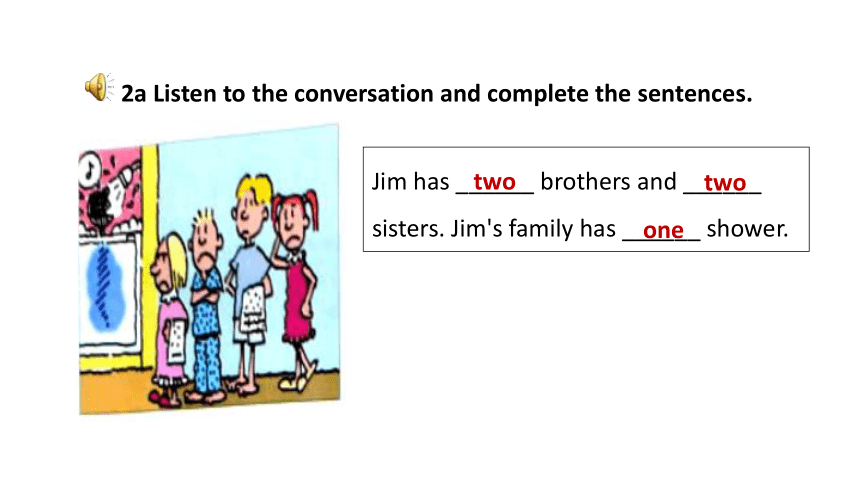
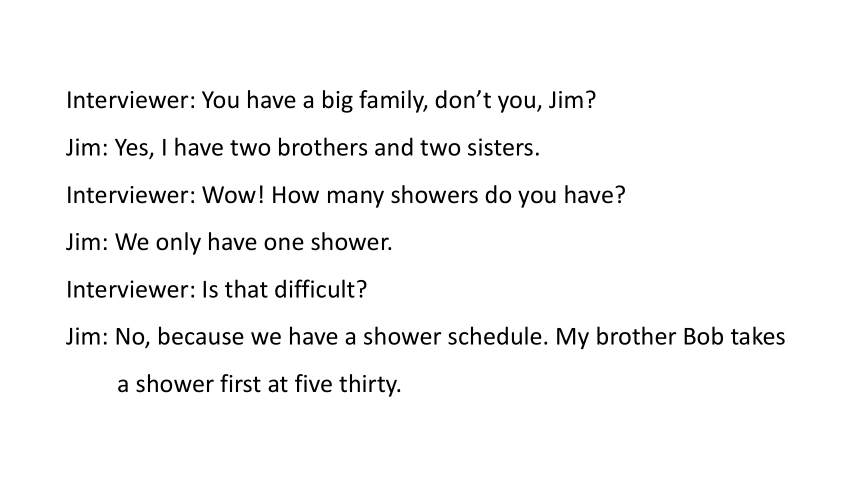
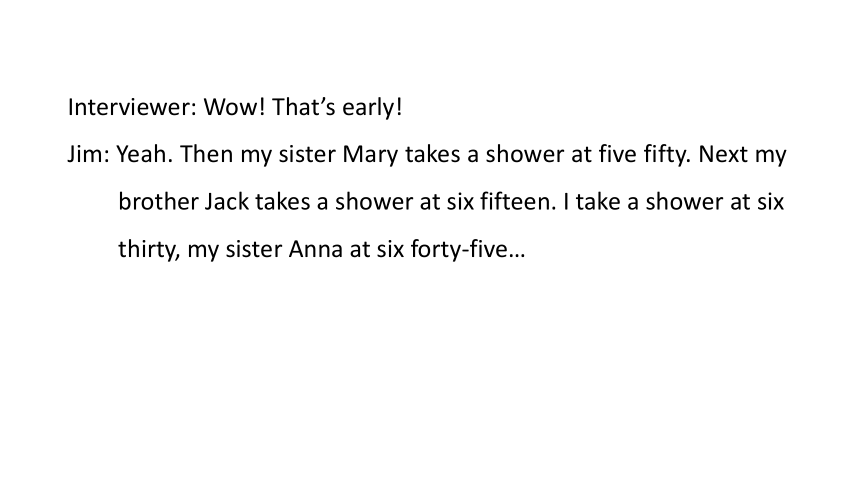
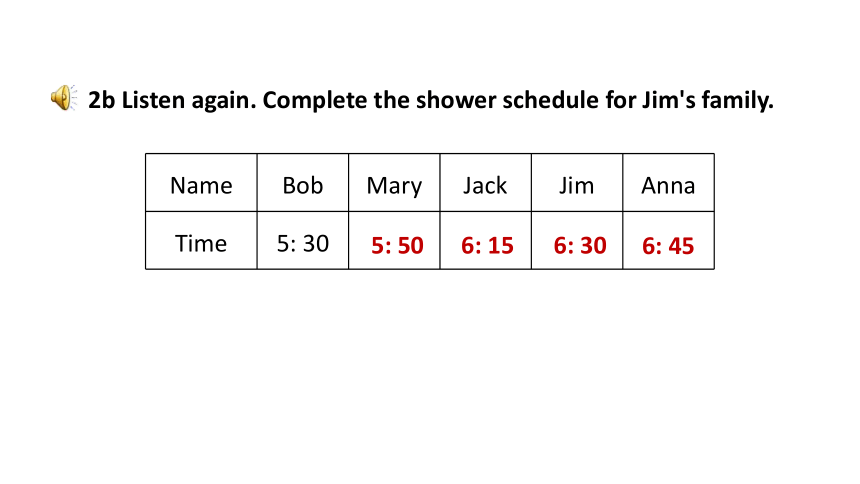
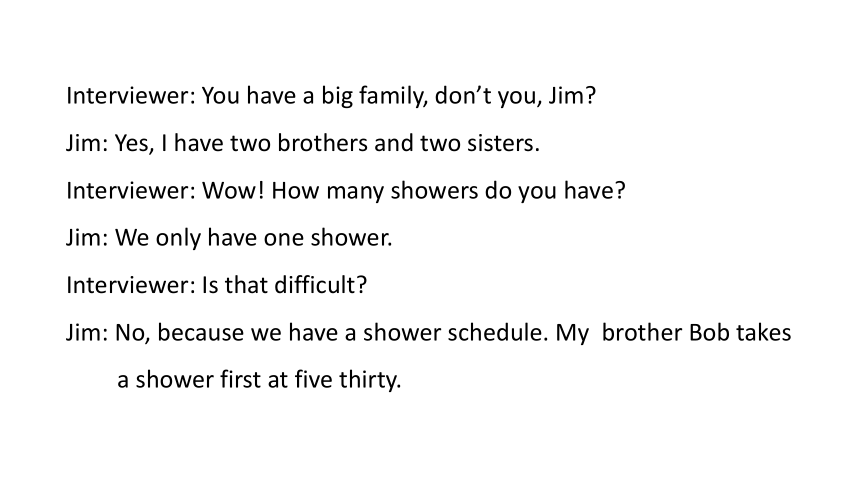
文档简介
(共57张PPT)
Period 1
Section A (1a-2d)
Unit 2
What time do you go to school
Do you know the other way to say time in English
1a Match the activities with the pictures.
1. get up ① ____ 2. go to school ② ______
3. get dressed ③ ______ 4. brush teeth ④ ______
5. eat breakfast ______ 6. take a shower ⑤ _____
Language Goals: Talk about routines; Ask about and say times
e
d
b
c
a
f
—What time do you usually get up, Rick
—I usually get up at six thirty. ⑥
1b Listen and match the times with the actions. Draw lines from the clocks to the pictures.
get up: six thirty
brush teeth and take a shower: six forty
eat breakfast: seven
get dressed: seven twenty
go to school: seven thirty
Interviewer: What time do you usually get up, Rick
Rick: Um, I usually get up at six thirty.
Interviewer: And what time do you brush your teeth and take a shower
Rick: I brush my teeth and take a shower at six forty.
Interviewer: Hmm. What time do you eat breakfast
Rick: Seven o’clock.
Interviewer: And what time do you usually get dressed
Rick: I usually get dressed at seven twenty.
Interviewer: And my last question. What time do you go to school
Rick: I usually go to school at seven thirty.
Interviewer: Thank you.
1c Student A is the interviewer. Student B is Rick. Ask and answer questions about Rick's day.
A: What time do you usually take a shower, Rick
B: I usually take a shower at six forty.
2a Listen to the conversation and complete the sentences.
Jim has ______ brothers and ______ sisters. Jim's family has ______ shower.
two
two
one
Interviewer: You have a big family, don’t you, Jim
Jim: Yes, I have two brothers and two sisters.
Interviewer: Wow! How many showers do you have
Jim: We only have one shower.
Interviewer: Is that difficult
Jim: No, because we have a shower schedule. My brother Bob takes a shower first at five thirty.
Interviewer: Wow! That’s early!
Jim: Yeah. Then my sister Mary takes a shower at five fifty. Next my brother Jack takes a shower at six fifteen. I take a shower at six thirty, my sister Anna at six forty-five…
2b Listen again. Complete the shower schedule for Jim's family.
Name Bob Mary Jack Jim Anna
Time 5: 30
5: 50
6: 15
6: 45
6: 30
Interviewer: You have a big family, don’t you, Jim
Jim: Yes, I have two brothers and two sisters.
Interviewer: Wow! How many showers do you have
Jim: We only have one shower.
Interviewer: Is that difficult
Jim: No, because we have a shower schedule. My brother Bob takes a shower first at five thirty.
Interviewer: Wow! That’s early!
Jim: Yeah. Then my sister Mary takes a shower at five fifty. Next my brother Jack takes a shower at six fifteen. I take a shower at six thirty, my sister Anna at six forty-five…
2c Now talk about yourself.
—What time do you usually get up
—I always get up at five fifty.
—Wow! I never get up so early. ⑦
规律的作息, 有助于我们合理安排学习、减少急
躁及焦虑的情绪、改善大脑专注 力和记忆力。
2d Role-play the conversation.
Interviewer: Scott has an interesting job. He works at a radio station. ⑧ Scott, what time is your radio show
Scott: From twelve o'clock at night to six o'clock in the morning.
Interviewer: What time do you usually get up
Scott: At eight thirty at night. Then I eat breakfast at nine.
Interviewer: That's a funny time for breakfast! ⑨
Scott: Yeah. After that, I usually exercise at about ten twenty. ⑩
Interviewer: When do you go to work
Scott: At eleven o'clock, so I'm never late for work.
养成不迟到的好习惯。
①get up
get up 起床
go to bed 是get up 的反义短语,意为“上床睡觉”。
e.g. My brother gets up at 6:00 in the morning and goes to bed at 10:00 in the evening.
我弟弟早晨6 点起床,晚上10 点上床睡觉。
拓展:get up 还可意为“站起”。
e.g. Don’t sit on the floor. Get up, please!
不要坐在地上,请站起来。
考点1
考向
和get相关的短语:
get to 到达
get on 上车
get off 下车
get back 返回
get down(从……)下来
get on well with...和……和睦相处
考题1: [武威] I _______ at 6 a.m. so I can leave for school at 7 a.m.
A. get up B. put up
C. take after D. get on
A
【点拨】用短语辨析法。get up 起床;put up 张贴,搭建;
take after 像;get on 上车。由后文“我可以7 点动身去学校”可知,这里表达6 点起床。
up / p/ adv.向上
e.g. The boy stands up and goes out.
这个男孩站起来,走了出去。
We watched as the sun went down.
我们看着夕阳西沉。
考点2
返回
adv. 向下
②go to school
go to school 去上学
考点3
辨析:go to school 与go to the school
go to school 去上学 表示去学校读书。
go to the school 去学校 只是表示去学校,不一定是去读书。
e.g. I don’t go to school today, but my father goes to the school to meet my teacher.
我今天没去上学,但是我父亲去学校见我的老师了。
拓展:“go to(+ 冠词) + n.”可表示参加音乐会、聚会、会议等,也可表示去做某事。类似的词组还有:go to bed 上床睡觉、go to work 去上班等。
e.g. My parents and my brother often go to work by bike.
我父母和我哥哥经常骑自行车去上班。
We’ll go to a party this Sunday.
这个星期日我们要去参加一个聚会。
与go 相关的短语:go home 回家
go on 继续 go back 返回
go shopping 去购物 go out 出去
go over 仔细检查
go on a trip 去旅游
go away 离开;走开
go for a walk/swim 去散步/游泳
返回
③get dressed
get dressed 穿上衣服
e.g. Let’s get dressed and go to the concert.
我们穿上衣服去音乐会吧。
Mr. Zhang is dressed in red/in a red jacket.
张先生穿着红色的衣服/ 一件红色的夹克衫。
考点4
get dressed 为固定短语,后面不能跟宾语。“be dressed in + 衣服或表示颜色的词”意为“穿着……的衣服”或“穿……颜色的衣服”,表示穿的状态。
dress /dres/ v. 穿衣服 n. 连衣裙
考点5
dress 用作动词,意为“穿衣服”。
用作可数名词,主要指女士穿的连衣裙。复数形式为dresses。
dress 作动词时的常用结构:
① dress sb.(或oneself) 给某人(自己) 穿衣服
② dress up 盛装打扮
③ dress up as... 打扮成……
dress 的具体用法:
考向
e.g. The girl often dresses her little sister in the morning.
这个女孩经常在早晨给她妹妹穿衣服。
My favorite singer is wearing a beautiful dress.
我最喜欢的歌手穿着一件漂亮的连衣裙。
dress 后接宾语时,只能接表示人的名词或代词。
考题2: The child doesn’t need any help. He is old enough to d himself.
ress
返回
④brush teeth
brush v. 刷; 刷净 n. 刷子
考点6
用作动词,意为“刷;刷净”,第三人称单数形式为brushes。brush one’s teeth 意为“刷牙”,其中one’s 是形容词性物主代词。
e.g. The boy is brushing his teeth with a toothbrush.
这个男孩儿正在用牙刷刷牙。
考向
牙刷
拓展:用作可数名词,意为“刷子”,复数形式为brushes。
e.g. There are different brushes in the shop.
在这家商店里有不同的刷子。
考题3: Alice always b her teeth after meals to have good teeth.
rushes
tooth /tu θ/ n. 牙齿
tooth 为可数名词,复数形式为teeth。
e.g. I’ve just had a tooth out at the dentist’s.
我刚在牙科诊所拔了一颗牙。
考点7
名词变复数变化不规则的词还有:
mouse → mice 老鼠
man → men 男人
child → children 小孩
woman → women 女人
速记小法:
名词变复数不规则变化歌诀:
男人女人a 变 e,
鹅足牙oo 变ee;
老鼠也好记,ous 变ic;
孩子加上 ren。
考向
考题4: It’s important for children to clean their ___________ (tooth) every day.
拓展:变复数时将“oo”变成“ee”的名词还有:foot—feet (脚);goose—geese(鹅)。
teeth
返回
⑤take a shower
shower /' a (r)/ n. 淋浴
e.g. I usually brush my teeth and take a shower(= have a shower) at seven o’clock daily.
我通常每天七点刷牙、洗淋浴。
考点8
洗淋浴
拓展:shower 的其他用法:
shower n. 阵雨(雪);淋浴器(间)
e.g. There will be a shower this morning.
今天上午会有阵雨。
Can I use the shower now
我现在能用一下淋浴间吗?
v. 淋浴
e.g. You can shower after getting up.
起床后你可以洗个淋浴。
返回
⑥ I usually get up at six thirty.
at / t/ prep. 在(某处、某时间或时刻)
考点9
速记小法:时间名词前介词的用法歌诀
表达时间有规范,介词放前没问题;
at 后面跟时刻,也与正午、午夜连;
月份、季节与年份,in 须奋勇站前边;
on 表具体某一天,日期、星期、节日前;
某天上午、下午与晚上,on 必担当无怨言。
辨析: at, in 与on 表示时间
at 常用于时刻前或一些习惯用语中。 at five o’clock 在五点钟
at noon/night 在中午/ 晚上
at that time 在那时
in 用在月份、季节、年份等前面, 也可以表示在早上、在下午或在晚上。 in May 在五月 in spring 在春季
in 2022 在2022 年 in the morning 在早上
on 用在具体日期、星期几、节日前, 也用来表示在具体某一天的上午、下午或晚上。 on Monday 在星期一
on Children’s Day 在儿童节
on the afternoon of July 8th 在7 月8 日的下午
on a cold morning 在一个寒冷的早晨
考题5: [营口] ________ such a cold morning, I also got up ________ 6 o’clock to go for a run as usual.
A. Before; in B. At; to
C. On; at D. In; at
C
返回
⑦ I never get up so early.
never /'nev (r)/ adv. 从不;绝不
频度副词,表示事情发生的频率为零,表示否定的意义。用于实义动词之前,系动词、情态动词或助动词之后。
e.g. Mary never goes out alone at night.
玛丽晚上从不单独外出。
It is never too late to mend.
亡羊补牢,未为迟也。
考点10
反义词为always,“总是;一直”。
考向
频度副词(频率从高到低):always 总是
usually 通常
often 经常
sometimes 有时
never 从不;绝不
考题6: [宁波] We should ___________ (从不) forget the people who helped us.
never
early/ (r) li/ adv.& adj. 早(的)
考点11
e.g. The early bus is very early, so we should get up early.
早班车非常早, 所以我们应该早起。
The early bird catches worms.
早起的鸟儿有虫吃。(谚语)
adj .作定语
adj .作表语
adv .作状语
联想记忆:
early adv. 在早期;早
adj. 早的
late adv. 晚,迟
adj. 晚的,迟的
反义
考题7: [新疆] My mother always gets up e to cook breakfast for me.
【点拨】由关键信息“cook breakfast”并结合首字母e 可知此处表示“早早起床”。
arly
返回
⑧ He works at a radio station.
work /w (r) k/ v.& n. 工作
work 在此处作不及物动词。work+-er(名词后缀) worker n.工作者;工作人员;工人。
e.g. My mother works in this school.
我妈妈在这所学校工作。
考点12
不及物动词
考向
辨析: work 与job
work 泛指生活中的各类工作,是不可数名词。 注意: work 和job 有时可互换。
job 指具体的职业或工作, 是可数名词。 拓展:work 还可作名词,是不可数名词。job 也可意为“工作”,二者区别如下:
e.g. No one wants to be out of work. 没有人想失业。
My job/work is teaching English. 我的工作是教英语。
Can you help me find work/a job in Shanghai
你能帮我在上海找到工作吗?
与work 相关的常用短语:work at 从事于;致力于
work out 计算出 at work 在工作中
go to work 去上班 out of work 失业
考题8: [宜宾] These days there are already some robots ______________ (工作) in factories.
working
考题9: My father has an interesting _______. He works at a radio station. He has much _______ to do every day.
A. job; job B. job; work
C. work; job D. work; works
【点拨】根据“My father has an interesting .”可知,此处应用可数名词,故用job;much 修饰不可数名词,故第二空用work。
B
station /'ste n/ n. 电( 视) 台;车站
e.g. My brother works at a radio station, but now he is at the bus station.
我哥哥在广播电台上班,但是现在他在公共汽车站。
考点13
station 构成的短语:① a radio station 广播电台
② a TV station 电视台 ③ a police station 警察局
④ a gas station 加油站 ⑤ a bus station 公共汽车站
⑥ a subway station 地铁站 ⑧ a coach station 长途汽车站
⑦ a train/railway station 火车站
返回
⑨ That’s a funny time for breakfast!
funny/f ni/ adj. 奇怪的; 滑稽好笑的
e.g. You can tell a short funny story to make people laugh.
你可以讲一个简短而有趣的故事来逗人们发笑。
It’s funny that he comes early.
真奇怪,他来得这么早。
考点14
作定语
作表语
温馨提示:① fun(乐趣)+-ny=funny 有趣的。
② funny 和fun 都有“有趣”之意,funny 指的是一种滑稽可笑的“有趣”。
拓展: :(1) fun 用作形容词,意为“有趣的;使人快乐的”。
e.g. —Let’s play games. 我们玩游戏吧。
—That sounds fun. 那听起来有趣。
(2) fun 用作不可数名词,意为“乐趣;快乐”。have fun 意为“玩得开心”;have fun doing sth. 意为“做某事很开心”。
e.g. I hope you’ll have fun at the party.
我希望你在聚会中过得愉快。
考题10: This dog looks _______. It’s wearing red shoes.
A. clever B. brave
C. funny D. careful
【点拨】用语境判定法。由“它穿着红色的鞋子。”可知,这只狗看上去很有趣。funny 意为“有趣的”。
C
...time for... 表示“做……的时间”
e.g. Tom’s mother has enough time for shopping today.
今天汤姆的妈妈有足够的时间购物。
He has little time to sleep. 他几乎没有时间睡觉。
It’s time for lunch/to have lunch. 该吃午饭了。
It’s time for us to go to the concert.
到我们去音乐会的时间了。
考点15
It's time for.../It's time to do... 到了该(做)……的时候了。
It's time for sb. to do sth. 到了某人该做某事的时候了。
相当于
...time to do...
返回
⑩ After that, I usually exercise at about ten twenty.
exercise /eks sa z/ v.& n. 锻炼; 练习
考点16
exercise v. 锻炼
n. 不可数名词,“锻炼;运动”,常与take、do、get 等词连用。
可数名词,“训练活动;练习;习题”。
exercise 的具体用法:
考向
e.g. It’s very important to exercise every day. 每天锻炼很重要。
The man often exercises his arms and legs.
这个男人经常锻炼他的胳膊和腿。
Don’t sit in front of the computer for too long. Stand up and
take some exercise. 不要在电脑前坐太久。站起来运动一下吧。
He asked the students to do some grammar exercises.
他让学生做了一些语法练习。
We do morning exercises and eye exercises every day.
我们每天做早操和眼保健操。
不及物动词
及物动词
考题11: [天津] To keep healthy, Daming’s grandparents _______ in a park every day.
A. exercise B. cough
C. sleep D. wait
【点拨】exercise 锻炼;cough 咳嗽;sleep 睡觉;wait 等待。根据“To keep healthy”可知此处指锻炼。
A
返回
At eleven o’clock, so I’m never late for work.
so /s / conj. 所以; 因此
e.g. Math is interesting, so I like it.
= I like math because it’s interesting.
数学很有趣,所以我喜欢它。
考点17
so 作连词,意为“所以;因此”,表示因果关系。可与because 引导的原因状语从句进行互换。
so 与because 不能出现在同一个句子中。
so 用来表示结果
be late for... ……迟到
e.g. The next morning, Erin was late for breakfast.
第二天早晨,艾琳吃早餐迟到了。
Are you often late for school
= Do you often come to school late
你经常上学迟到吗?
考点18
be late for ...
=come to ... late
……迟到
考题12: 上课不要迟到。
Don’t ________________ class.
be late for
返回
本节课主要练习了听力, 学习了知识点get up, get dressed, teeth, take a shower, what time, at six forty, work, from…to…, night, That’s a funny time for breakfast!, exercise, be late for的用法, 学会了谈论日常活动的时间。
Period 1
Section A (1a-2d)
Unit 2
What time do you go to school
Do you know the other way to say time in English
1a Match the activities with the pictures.
1. get up ① ____ 2. go to school ② ______
3. get dressed ③ ______ 4. brush teeth ④ ______
5. eat breakfast ______ 6. take a shower ⑤ _____
Language Goals: Talk about routines; Ask about and say times
e
d
b
c
a
f
—What time do you usually get up, Rick
—I usually get up at six thirty. ⑥
1b Listen and match the times with the actions. Draw lines from the clocks to the pictures.
get up: six thirty
brush teeth and take a shower: six forty
eat breakfast: seven
get dressed: seven twenty
go to school: seven thirty
Interviewer: What time do you usually get up, Rick
Rick: Um, I usually get up at six thirty.
Interviewer: And what time do you brush your teeth and take a shower
Rick: I brush my teeth and take a shower at six forty.
Interviewer: Hmm. What time do you eat breakfast
Rick: Seven o’clock.
Interviewer: And what time do you usually get dressed
Rick: I usually get dressed at seven twenty.
Interviewer: And my last question. What time do you go to school
Rick: I usually go to school at seven thirty.
Interviewer: Thank you.
1c Student A is the interviewer. Student B is Rick. Ask and answer questions about Rick's day.
A: What time do you usually take a shower, Rick
B: I usually take a shower at six forty.
2a Listen to the conversation and complete the sentences.
Jim has ______ brothers and ______ sisters. Jim's family has ______ shower.
two
two
one
Interviewer: You have a big family, don’t you, Jim
Jim: Yes, I have two brothers and two sisters.
Interviewer: Wow! How many showers do you have
Jim: We only have one shower.
Interviewer: Is that difficult
Jim: No, because we have a shower schedule. My brother Bob takes a shower first at five thirty.
Interviewer: Wow! That’s early!
Jim: Yeah. Then my sister Mary takes a shower at five fifty. Next my brother Jack takes a shower at six fifteen. I take a shower at six thirty, my sister Anna at six forty-five…
2b Listen again. Complete the shower schedule for Jim's family.
Name Bob Mary Jack Jim Anna
Time 5: 30
5: 50
6: 15
6: 45
6: 30
Interviewer: You have a big family, don’t you, Jim
Jim: Yes, I have two brothers and two sisters.
Interviewer: Wow! How many showers do you have
Jim: We only have one shower.
Interviewer: Is that difficult
Jim: No, because we have a shower schedule. My brother Bob takes a shower first at five thirty.
Interviewer: Wow! That’s early!
Jim: Yeah. Then my sister Mary takes a shower at five fifty. Next my brother Jack takes a shower at six fifteen. I take a shower at six thirty, my sister Anna at six forty-five…
2c Now talk about yourself.
—What time do you usually get up
—I always get up at five fifty.
—Wow! I never get up so early. ⑦
规律的作息, 有助于我们合理安排学习、减少急
躁及焦虑的情绪、改善大脑专注 力和记忆力。
2d Role-play the conversation.
Interviewer: Scott has an interesting job. He works at a radio station. ⑧ Scott, what time is your radio show
Scott: From twelve o'clock at night to six o'clock in the morning.
Interviewer: What time do you usually get up
Scott: At eight thirty at night. Then I eat breakfast at nine.
Interviewer: That's a funny time for breakfast! ⑨
Scott: Yeah. After that, I usually exercise at about ten twenty. ⑩
Interviewer: When do you go to work
Scott: At eleven o'clock, so I'm never late for work.
养成不迟到的好习惯。
①get up
get up 起床
go to bed 是get up 的反义短语,意为“上床睡觉”。
e.g. My brother gets up at 6:00 in the morning and goes to bed at 10:00 in the evening.
我弟弟早晨6 点起床,晚上10 点上床睡觉。
拓展:get up 还可意为“站起”。
e.g. Don’t sit on the floor. Get up, please!
不要坐在地上,请站起来。
考点1
考向
和get相关的短语:
get to 到达
get on 上车
get off 下车
get back 返回
get down(从……)下来
get on well with...和……和睦相处
考题1: [武威] I _______ at 6 a.m. so I can leave for school at 7 a.m.
A. get up B. put up
C. take after D. get on
A
【点拨】用短语辨析法。get up 起床;put up 张贴,搭建;
take after 像;get on 上车。由后文“我可以7 点动身去学校”可知,这里表达6 点起床。
up / p/ adv.向上
e.g. The boy stands up and goes out.
这个男孩站起来,走了出去。
We watched as the sun went down.
我们看着夕阳西沉。
考点2
返回
adv. 向下
②go to school
go to school 去上学
考点3
辨析:go to school 与go to the school
go to school 去上学 表示去学校读书。
go to the school 去学校 只是表示去学校,不一定是去读书。
e.g. I don’t go to school today, but my father goes to the school to meet my teacher.
我今天没去上学,但是我父亲去学校见我的老师了。
拓展:“go to(+ 冠词) + n.”可表示参加音乐会、聚会、会议等,也可表示去做某事。类似的词组还有:go to bed 上床睡觉、go to work 去上班等。
e.g. My parents and my brother often go to work by bike.
我父母和我哥哥经常骑自行车去上班。
We’ll go to a party this Sunday.
这个星期日我们要去参加一个聚会。
与go 相关的短语:go home 回家
go on 继续 go back 返回
go shopping 去购物 go out 出去
go over 仔细检查
go on a trip 去旅游
go away 离开;走开
go for a walk/swim 去散步/游泳
返回
③get dressed
get dressed 穿上衣服
e.g. Let’s get dressed and go to the concert.
我们穿上衣服去音乐会吧。
Mr. Zhang is dressed in red/in a red jacket.
张先生穿着红色的衣服/ 一件红色的夹克衫。
考点4
get dressed 为固定短语,后面不能跟宾语。“be dressed in + 衣服或表示颜色的词”意为“穿着……的衣服”或“穿……颜色的衣服”,表示穿的状态。
dress /dres/ v. 穿衣服 n. 连衣裙
考点5
dress 用作动词,意为“穿衣服”。
用作可数名词,主要指女士穿的连衣裙。复数形式为dresses。
dress 作动词时的常用结构:
① dress sb.(或oneself) 给某人(自己) 穿衣服
② dress up 盛装打扮
③ dress up as... 打扮成……
dress 的具体用法:
考向
e.g. The girl often dresses her little sister in the morning.
这个女孩经常在早晨给她妹妹穿衣服。
My favorite singer is wearing a beautiful dress.
我最喜欢的歌手穿着一件漂亮的连衣裙。
dress 后接宾语时,只能接表示人的名词或代词。
考题2: The child doesn’t need any help. He is old enough to d himself.
ress
返回
④brush teeth
brush v. 刷; 刷净 n. 刷子
考点6
用作动词,意为“刷;刷净”,第三人称单数形式为brushes。brush one’s teeth 意为“刷牙”,其中one’s 是形容词性物主代词。
e.g. The boy is brushing his teeth with a toothbrush.
这个男孩儿正在用牙刷刷牙。
考向
牙刷
拓展:用作可数名词,意为“刷子”,复数形式为brushes。
e.g. There are different brushes in the shop.
在这家商店里有不同的刷子。
考题3: Alice always b her teeth after meals to have good teeth.
rushes
tooth /tu θ/ n. 牙齿
tooth 为可数名词,复数形式为teeth。
e.g. I’ve just had a tooth out at the dentist’s.
我刚在牙科诊所拔了一颗牙。
考点7
名词变复数变化不规则的词还有:
mouse → mice 老鼠
man → men 男人
child → children 小孩
woman → women 女人
速记小法:
名词变复数不规则变化歌诀:
男人女人a 变 e,
鹅足牙oo 变ee;
老鼠也好记,ous 变ic;
孩子加上 ren。
考向
考题4: It’s important for children to clean their ___________ (tooth) every day.
拓展:变复数时将“oo”变成“ee”的名词还有:foot—feet (脚);goose—geese(鹅)。
teeth
返回
⑤take a shower
shower /' a (r)/ n. 淋浴
e.g. I usually brush my teeth and take a shower(= have a shower) at seven o’clock daily.
我通常每天七点刷牙、洗淋浴。
考点8
洗淋浴
拓展:shower 的其他用法:
shower n. 阵雨(雪);淋浴器(间)
e.g. There will be a shower this morning.
今天上午会有阵雨。
Can I use the shower now
我现在能用一下淋浴间吗?
v. 淋浴
e.g. You can shower after getting up.
起床后你可以洗个淋浴。
返回
⑥ I usually get up at six thirty.
at / t/ prep. 在(某处、某时间或时刻)
考点9
速记小法:时间名词前介词的用法歌诀
表达时间有规范,介词放前没问题;
at 后面跟时刻,也与正午、午夜连;
月份、季节与年份,in 须奋勇站前边;
on 表具体某一天,日期、星期、节日前;
某天上午、下午与晚上,on 必担当无怨言。
辨析: at, in 与on 表示时间
at 常用于时刻前或一些习惯用语中。 at five o’clock 在五点钟
at noon/night 在中午/ 晚上
at that time 在那时
in 用在月份、季节、年份等前面, 也可以表示在早上、在下午或在晚上。 in May 在五月 in spring 在春季
in 2022 在2022 年 in the morning 在早上
on 用在具体日期、星期几、节日前, 也用来表示在具体某一天的上午、下午或晚上。 on Monday 在星期一
on Children’s Day 在儿童节
on the afternoon of July 8th 在7 月8 日的下午
on a cold morning 在一个寒冷的早晨
考题5: [营口] ________ such a cold morning, I also got up ________ 6 o’clock to go for a run as usual.
A. Before; in B. At; to
C. On; at D. In; at
C
返回
⑦ I never get up so early.
never /'nev (r)/ adv. 从不;绝不
频度副词,表示事情发生的频率为零,表示否定的意义。用于实义动词之前,系动词、情态动词或助动词之后。
e.g. Mary never goes out alone at night.
玛丽晚上从不单独外出。
It is never too late to mend.
亡羊补牢,未为迟也。
考点10
反义词为always,“总是;一直”。
考向
频度副词(频率从高到低):always 总是
usually 通常
often 经常
sometimes 有时
never 从不;绝不
考题6: [宁波] We should ___________ (从不) forget the people who helped us.
never
early/ (r) li/ adv.& adj. 早(的)
考点11
e.g. The early bus is very early, so we should get up early.
早班车非常早, 所以我们应该早起。
The early bird catches worms.
早起的鸟儿有虫吃。(谚语)
adj .作定语
adj .作表语
adv .作状语
联想记忆:
early adv. 在早期;早
adj. 早的
late adv. 晚,迟
adj. 晚的,迟的
反义
考题7: [新疆] My mother always gets up e to cook breakfast for me.
【点拨】由关键信息“cook breakfast”并结合首字母e 可知此处表示“早早起床”。
arly
返回
⑧ He works at a radio station.
work /w (r) k/ v.& n. 工作
work 在此处作不及物动词。work+-er(名词后缀) worker n.工作者;工作人员;工人。
e.g. My mother works in this school.
我妈妈在这所学校工作。
考点12
不及物动词
考向
辨析: work 与job
work 泛指生活中的各类工作,是不可数名词。 注意: work 和job 有时可互换。
job 指具体的职业或工作, 是可数名词。 拓展:work 还可作名词,是不可数名词。job 也可意为“工作”,二者区别如下:
e.g. No one wants to be out of work. 没有人想失业。
My job/work is teaching English. 我的工作是教英语。
Can you help me find work/a job in Shanghai
你能帮我在上海找到工作吗?
与work 相关的常用短语:work at 从事于;致力于
work out 计算出 at work 在工作中
go to work 去上班 out of work 失业
考题8: [宜宾] These days there are already some robots ______________ (工作) in factories.
working
考题9: My father has an interesting _______. He works at a radio station. He has much _______ to do every day.
A. job; job B. job; work
C. work; job D. work; works
【点拨】根据“My father has an interesting .”可知,此处应用可数名词,故用job;much 修饰不可数名词,故第二空用work。
B
station /'ste n/ n. 电( 视) 台;车站
e.g. My brother works at a radio station, but now he is at the bus station.
我哥哥在广播电台上班,但是现在他在公共汽车站。
考点13
station 构成的短语:① a radio station 广播电台
② a TV station 电视台 ③ a police station 警察局
④ a gas station 加油站 ⑤ a bus station 公共汽车站
⑥ a subway station 地铁站 ⑧ a coach station 长途汽车站
⑦ a train/railway station 火车站
返回
⑨ That’s a funny time for breakfast!
funny/f ni/ adj. 奇怪的; 滑稽好笑的
e.g. You can tell a short funny story to make people laugh.
你可以讲一个简短而有趣的故事来逗人们发笑。
It’s funny that he comes early.
真奇怪,他来得这么早。
考点14
作定语
作表语
温馨提示:① fun(乐趣)+-ny=funny 有趣的。
② funny 和fun 都有“有趣”之意,funny 指的是一种滑稽可笑的“有趣”。
拓展: :(1) fun 用作形容词,意为“有趣的;使人快乐的”。
e.g. —Let’s play games. 我们玩游戏吧。
—That sounds fun. 那听起来有趣。
(2) fun 用作不可数名词,意为“乐趣;快乐”。have fun 意为“玩得开心”;have fun doing sth. 意为“做某事很开心”。
e.g. I hope you’ll have fun at the party.
我希望你在聚会中过得愉快。
考题10: This dog looks _______. It’s wearing red shoes.
A. clever B. brave
C. funny D. careful
【点拨】用语境判定法。由“它穿着红色的鞋子。”可知,这只狗看上去很有趣。funny 意为“有趣的”。
C
...time for... 表示“做……的时间”
e.g. Tom’s mother has enough time for shopping today.
今天汤姆的妈妈有足够的时间购物。
He has little time to sleep. 他几乎没有时间睡觉。
It’s time for lunch/to have lunch. 该吃午饭了。
It’s time for us to go to the concert.
到我们去音乐会的时间了。
考点15
It's time for.../It's time to do... 到了该(做)……的时候了。
It's time for sb. to do sth. 到了某人该做某事的时候了。
相当于
...time to do...
返回
⑩ After that, I usually exercise at about ten twenty.
exercise /eks sa z/ v.& n. 锻炼; 练习
考点16
exercise v. 锻炼
n. 不可数名词,“锻炼;运动”,常与take、do、get 等词连用。
可数名词,“训练活动;练习;习题”。
exercise 的具体用法:
考向
e.g. It’s very important to exercise every day. 每天锻炼很重要。
The man often exercises his arms and legs.
这个男人经常锻炼他的胳膊和腿。
Don’t sit in front of the computer for too long. Stand up and
take some exercise. 不要在电脑前坐太久。站起来运动一下吧。
He asked the students to do some grammar exercises.
他让学生做了一些语法练习。
We do morning exercises and eye exercises every day.
我们每天做早操和眼保健操。
不及物动词
及物动词
考题11: [天津] To keep healthy, Daming’s grandparents _______ in a park every day.
A. exercise B. cough
C. sleep D. wait
【点拨】exercise 锻炼;cough 咳嗽;sleep 睡觉;wait 等待。根据“To keep healthy”可知此处指锻炼。
A
返回
At eleven o’clock, so I’m never late for work.
so /s / conj. 所以; 因此
e.g. Math is interesting, so I like it.
= I like math because it’s interesting.
数学很有趣,所以我喜欢它。
考点17
so 作连词,意为“所以;因此”,表示因果关系。可与because 引导的原因状语从句进行互换。
so 与because 不能出现在同一个句子中。
so 用来表示结果
be late for... ……迟到
e.g. The next morning, Erin was late for breakfast.
第二天早晨,艾琳吃早餐迟到了。
Are you often late for school
= Do you often come to school late
你经常上学迟到吗?
考点18
be late for ...
=come to ... late
……迟到
考题12: 上课不要迟到。
Don’t ________________ class.
be late for
返回
本节课主要练习了听力, 学习了知识点get up, get dressed, teeth, take a shower, what time, at six forty, work, from…to…, night, That’s a funny time for breakfast!, exercise, be late for的用法, 学会了谈论日常活动的时间。
同课章节目录
- Unit 1 Can you play the guitar?
- Section A
- Section B
- Unit 2 What time do you go to school?
- Section A
- Section B
- Unit 3 How do you get to school?
- Section A
- Section B
- Unit 4 Don't eat in class.
- Section A
- Section B
- Unit 5 Why do you like pandas?
- Section A
- Section B
- Unit 6 I'm watching TV.
- Section A
- Section B
- Review of Units 1-6
- Unit 7 It's raining!
- Section A
- Section B
- Unit 8 Is there a post office near here?
- Section A
- Section B
- Unit 9 What does he look like?
- Section A
- Section B
- Unit 10 I'd like some noodles.
- Section A
- Section B
- Unit 11 How was your school trip?
- Section A
- Section B
- Unit 12 What did you do last weekend?
- Section A
- Section B
